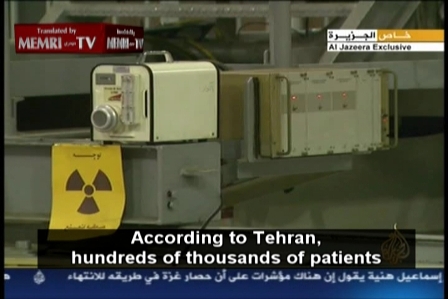The following is research published today from the Special Dispatch Series, and the MEMRI TV Project from MEMRI's Iran Studies Project. To view the MEMRI Iran Studies Project page, visit http://www.memri.org/content/en/country.htm?country=iran. Special Dispatch No 3021—Lebanon/Inter-Arab Relations The secretary-general of the Hezbollah-Iran organization, Ayatollah Mohammad Baqer Kharrazi, who is an elite member of Iran's Islamic regime, recently published an article on the organization's website discussing the need to reestablish "Greater Iran," stretching from Palestine to Afghanistan and based on the pre-Islamic Persian Empire, as a preparatory stage for the coming of the Mahdi – the Hidden Imam (the Shi'ite Messiah). In his article, Ayatollah Kharrazi stresses Iran's superiority over the Arabs and the other peoples in the region. Ayatollah Kharrazi sets out in detail Hezbollah-Iran's manifesto. The first stage involves the establishment of Greater Iran on the territory of the ancient Persian Empire; it will include the various ethnic groups and peoples in the Middle East, Central Asia, the Caucasus, and Afghanistan, and create a union of Islamic states, led by Iran. The unification of the states and peoples of these regions into Greater Iran will not be carried out by military occupation, he says, but peaceably, as in the case of the European Union. In subsequent stages, he writes, the Iranian Empire will face the transregional unions that belong to the 'arrogance' – i.e. the U.S. and Russia – and will unify the oppressed (mustazafin) into a global village to stand against the arrogant, in advance of the establishment of a global government headed by the Mahdi. Ayatollah Kharrazi also discusses the question of why the Koran appeared in Arabic, not in Persian, and why the figures holy to Shi'ite Muslims, i.e. the Prophet himself and the Twelve Imams, were all Arabs, not Persians – in a way that reveals his hostility and arrogance towards the Arabs. In his article, Ayatollah Kharrazi goes beyond the traditional Islamic-Shi'ite values of the Islamic Republic of Iran – chiefly, velayat-e faqih, or "rule of the jurisprudent," and belief in the messianic deliverance of the Shi'ia by the Hidden Imam (Mahdi) – and lays out the foundations of Greater Iran based on pre-Islamic Iranian-Persian nationalism and on pre-Islamic Persian empires, defining all the peoples who lived in those lands as Iranians. To read the full report, visit http://www.memri.org/report/en/0/0/0/0/0/0/4358.htm. Special Dispatch No. 3020—U.S. and the Arab and Muslim World The following excerpts are from an interview with Iranian President Mahmoud Ahmadinejad, which aired on Al-Jazeera TV on May 14, 2010. The translation is from the Arabic voiceover. Interviewer: "Do you rule out the possibility of a war between Iran and the U.S. in the future?" Mahmoud Ahmadinejad: "This is completely out of the question. Who would want to wage war against Iran? No country would do that, and there is no evidence of any war between us. We consider friendship and dialogue to be the best way. Today, nobody would be pleased if a war broke out, and nobody is capable of opening fire on Iran, or even dares to do so. Who wants to fight Iran?" Interviewer: "Israel." To view this clip on MEMRI TV, visit http://www.memritv.org/clip/en/0/0/0/0/0/0/2497.htm. To read the full report, visit http://www.memri.org/report/en/0/0/0/0/0/0/4357.htm. Special Dispatch No. 3019—Saudi Arabia/Lebanon/Inter-Arab Relations In a May 31, 2010 article in Al-Sharq Al-Awsat, 'Abd Al-Rahman Al-Rashed, the paper's former editor and director-general of Al-Arabiya TV, strongly criticized the Lebanese politicians for unanimously supporting Hizbullah's right to arm itself. This criticism is presumably directed mainly at the March 14 Forces, who in the past were strongly opposed to Hizbullah's arms, but who have now changed their position – a move which, according to Al-Rashed, is motivated by personal and political fears. It should be noted that the March 14 Forces' policy shift is a direct result of Saudi Arabia's rapprochement with Syria. The Saudis, formerly the March 14 Forces' strongest allies, have been pressuring them to comply with the Syrian agenda, forcing them into a national unity government with Hizbullah . This makes Al-Rashed's criticism intruiging, since he is a prominent spokesman for the Saudi regime. To read the full report, visit http://www.memri.org/report/en/0/0/0/0/0/0/4356.htm. MEMRI TV Clip No. 2488 - Al-Jazeera TV Shows Footage of Tehran’s Nuclear Reactor The following excerpts are from an Al-Jazeera TV report on Tehran’s nuclear reactor, which aired on May 28, 2010. To view this clip, visit http://www.memritv.org/clip/en/0/0/0/0/0/0/2488.htm.
June 10, 2010
![]()
*Special Dispatch Series
The Iranian Supremacy Manifesto of 'Greater Iran': Hezbollah-Iran Secretary-General
Lays out Plan, Strategy for Reestablishing 'Greater Iran' as Prelude to Establishment of
Global Government Led by the Mahdi
Iranian President Mahmoud Ahmadinejad: If Obama Follows in Bush's Footsteps - America Will Come to an End

Following March 14 Forces' Capitulation to Hizbullah Under Saudi Pressure, Prominent Saudi Journalist Criticizes Lebanese Politicians for Policy Turnabout
*From MEMRI TV



Thursday, 10 June 2010
Posted by
Britannia Radio
at
21:31
![]()





















